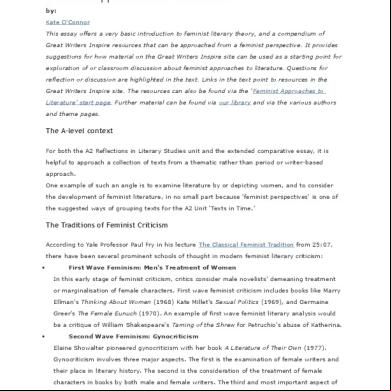Approaches To Teaching Literature 6hq1a
This document was ed by and they confirmed that they have the permission to share it. If you are author or own the copyright of this book, please report to us by using this report form. Report 2z6p3t
Overview 5o1f4z
& View Approaches To Teaching Literature as PDF for free.
More details 6z3438
- Words: 452
- Pages: 18
Approaches to Teaching Literature
Overview Methods must: • show how language, literature and composition are inseparable • show how teachers can teach them in a logical organized manner • show the necessity and means of skills instruction (spelling, vocabulary, reading, library, dictionary skills)
Overview Methods must: • make teachers know how to stimulate interest, communicate with students, draw their experiences • make teachers speculate what was right and wrong in past lessons • help teachers develop good attitudes and enthusiasm for teaching
Classification of instructional practices (Carlsen, 1965: 364) • Teacher tells (students memorizes and stores) • Teacher moulds (students conforms) • Teacher stimulates (students teach themselves) The most likelihood in M’sian setting
Harding modes of presentation • The child and the book (making materials accessible to the students) • The literature as group experience (inclusive of all types of genres) • Presentation of materials accompanied by discussion (accessible materials should be readable by students without help)
3 Main Approaches to Teaching Literature (Carter, 1988: 3)
• Information-based approach • Personal response-based approach • Language-based approach
Information-based Approach • • • •
Treat literature as a source of facts Students read for information Classes are teacher-centred Students will become knowledgeable in history • Little engagement with literary text
Personal response-based Approach • Aimed at motivating students to relate the literary themes and topics to their personal experience • Classes are student-centred • Emphasize question-discussion methodologies
Language-based Approach • • • •
Activity-based Classes are student-centred Developing language competence Leading to productive used of the language
Approach and Method • See page 59 and 60 of Rosli Talif book
A Survey of Approaches to Literature • • • • • • • •
Practical criticism New criticism/Formalistic approach Reader response/Transactional approach Schema approach Literary stylistics approach Literary history/New historicism approach Biographical approach Psychological approach
A Survey of Approaches to Literature • • • • •
Socio-psychological approach Paraphrastic approach Cognitive psychology approach Mythological and archetypal approaches Moral-philosophical approach
Language-based Approaches Developing study skills in reading literature • Prediction • Summary • Forum or debate • Re-translation • opinionnaire
Prediction • Elicit prediction at crucial points in the text • Identify the crucial point • Ask students to make predictions in group
Summary • Let students to tell the story • Discuss certain elements like plot and themes • Allow students to be familiar with the set-up of interpreting text
Forum or Debate • Proposing versus opposing views on text • Stimulates oral language practice • Promotes different tolerance of different interpretations of the same text
Re-translation • From target language to native language • Compared both versions • Able to gauge lexical and structural level in writing
Opinionnaire • Nope. Don’t do this.
Overview Methods must: • show how language, literature and composition are inseparable • show how teachers can teach them in a logical organized manner • show the necessity and means of skills instruction (spelling, vocabulary, reading, library, dictionary skills)
Overview Methods must: • make teachers know how to stimulate interest, communicate with students, draw their experiences • make teachers speculate what was right and wrong in past lessons • help teachers develop good attitudes and enthusiasm for teaching
Classification of instructional practices (Carlsen, 1965: 364) • Teacher tells (students memorizes and stores) • Teacher moulds (students conforms) • Teacher stimulates (students teach themselves) The most likelihood in M’sian setting
Harding modes of presentation • The child and the book (making materials accessible to the students) • The literature as group experience (inclusive of all types of genres) • Presentation of materials accompanied by discussion (accessible materials should be readable by students without help)
3 Main Approaches to Teaching Literature (Carter, 1988: 3)
• Information-based approach • Personal response-based approach • Language-based approach
Information-based Approach • • • •
Treat literature as a source of facts Students read for information Classes are teacher-centred Students will become knowledgeable in history • Little engagement with literary text
Personal response-based Approach • Aimed at motivating students to relate the literary themes and topics to their personal experience • Classes are student-centred • Emphasize question-discussion methodologies
Language-based Approach • • • •
Activity-based Classes are student-centred Developing language competence Leading to productive used of the language
Approach and Method • See page 59 and 60 of Rosli Talif book
A Survey of Approaches to Literature • • • • • • • •
Practical criticism New criticism/Formalistic approach Reader response/Transactional approach Schema approach Literary stylistics approach Literary history/New historicism approach Biographical approach Psychological approach
A Survey of Approaches to Literature • • • • •
Socio-psychological approach Paraphrastic approach Cognitive psychology approach Mythological and archetypal approaches Moral-philosophical approach
Language-based Approaches Developing study skills in reading literature • Prediction • Summary • Forum or debate • Re-translation • opinionnaire
Prediction • Elicit prediction at crucial points in the text • Identify the crucial point • Ask students to make predictions in group
Summary • Let students to tell the story • Discuss certain elements like plot and themes • Allow students to be familiar with the set-up of interpreting text
Forum or Debate • Proposing versus opposing views on text • Stimulates oral language practice • Promotes different tolerance of different interpretations of the same text
Re-translation • From target language to native language • Compared both versions • Able to gauge lexical and structural level in writing
Opinionnaire • Nope. Don’t do this.





